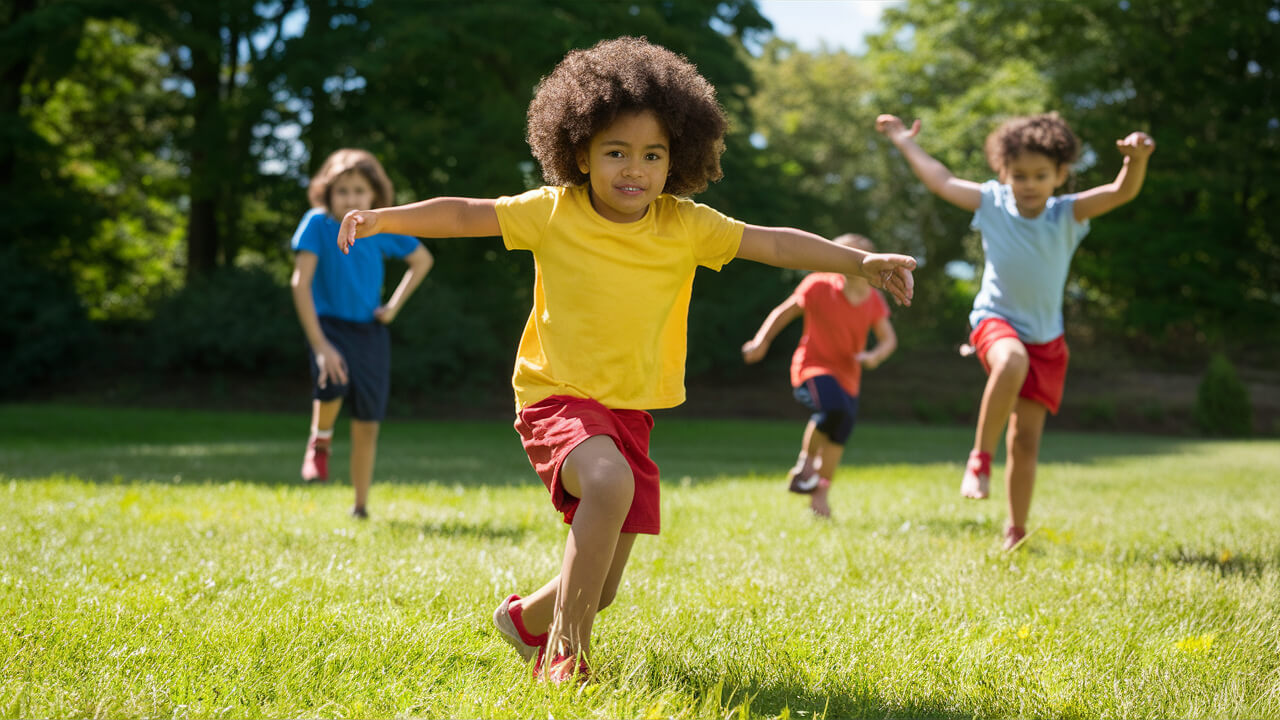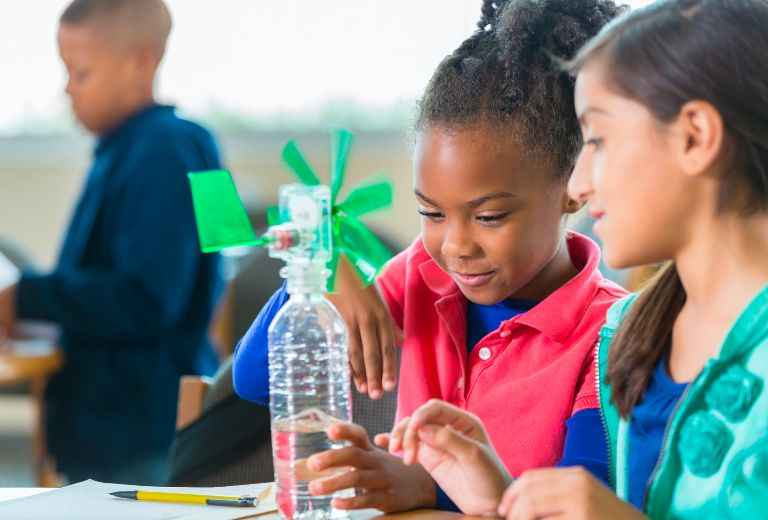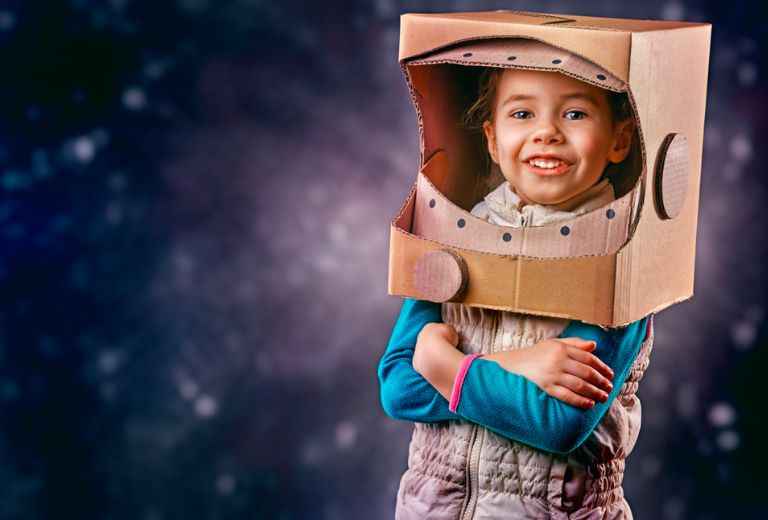
The Power of Physical Play
"The Power of Physical Play" explores the importance of physical activity in the development of children. The content discusses how engaging in play helps children learn, develop motor skills, and build social relationships. It also emphasises the role of physical play in enhancing cognitive abilities and promoting overall well-being. We provide practical tips and activities for parents, educators, and caregivers to incorporate more physical play into children's daily routines.

Mejbahul Alam
Writer
PUBLISHED ONJan 29, 2024
The Power of Physical Play: A Gateway to Well-Being
In today's digital age, children are often consumed by screens, spending hours playing video games, watching TV, and browsing social media. As a result, physical play has taken a backseat, leading to a decline in physical activity and an increase in childhood obesity. However, the power of physical play should not be underestimated. Engaging in physical activities such as running, jumping, and climbing not only provides countless health benefits but also plays a crucial role in a child's development.
Physical play is essential for building strength, coordination, and motor skills. It helps children develop spatial awareness, balance, and agility, all of which are important for their overall physical health. Furthermore, physical play also promotes mental and emotional well-being. It allows children to release pent-up energy and reduce stress, leading to improved mood and better sleep patterns. Physical play is essential for social development. When children engage in physical activities together, they learn important social skills such as cooperation, communication, and teamwork. These skills are invaluable for building strong relationships and navigating social situations throughout life.

Ultimately, physical play is not just about moving and having fun—it's about laying the groundwork for a healthy and well-rounded individual. As parents, caregivers, and educators, it's important to prioritize physical play and provide children with ample opportunities to engage in active play. By doing so, we can help them develop physically, mentally, and socially, setting them up for a lifetime of health and happiness.
Understanding the Importance of Active Play in Daily Life
Understanding the importance of active play in daily life is crucial for both physical and mental well-being. Engaging in activities such as running, jumping, playing sports, and participating in outdoor games not only promotes physical fitness and strength, but also helps in the development of important social and cognitive skills. Active play stimulates the release of endorphins, which are natural mood boosters, and also helps in reducing stress and anxiety. It is a great way to improve cardiovascular health, build muscle strength, and enhance flexibility.
The Power of Physical Play
- The Power of Physical Play: A Gateway to Well-Being
- Understanding the Importance of Active Play in Daily Life
- The Mind-Body Connection: How Physical Play Boosts Mental Health
- Benefits of Incorporating Physical Play for Children
- Unlocking the Adult Playground: Fun Ways to Stay Active
- Why Play Matters: Exploring the Psychological Effects
- Games, Sports, and Leisure: Diverse Forms of Physical Play
- The Social Aspect: Connecting through Playful Activities
- The Science Behind Endorphins: How Playful Activities Boost Happiness
- Play as Therapy: Healing Through Movement and Expression
- Playful Fitness: A Fun Approach to Exercise for a Healthier You
- Some Questions and Answers
- Why is physical play important for mental health?
- What role does physical play play in children's development?
- Can adults benefit from incorporating play into their routine?
- How can physical play enhance social connections?
- Is there a recommended balance between screen time and physical play?
Active play encourages children and adults alike to develop teamwork, communication, and problem-solving skills. It fosters creativity and imagination, as well as teaches important life lessons such as sportsmanship and resilience. In a world that is becoming increasingly sedentary due to technological advancements, understanding the importance of active play in daily life is essential for maintaining a healthy lifestyle. It is important to encourage and promote active play among individuals of all ages, for a balanced and fulfilling life.
The Mind-Body Connection: How Physical Play Boosts Mental Health
Understanding the importance of active play in daily life is crucial for maintaining a healthy mind-body connection. Physical play, such as running, jumping, and other forms of exercise, not only helps keep our bodies in shape, but also has a powerful impact on our mental health. Engaging in regular physical activity has been shown to reduce stress, anxiety, and depression, and boost overall mood and cognitive function. When we move our bodies and engage in active play, our brains release endorphins, which are chemicals that act as natural stress relievers and mood lifters.
Additionally, physical play can improve our ability to focus and concentrate, as well as enhance creativity and problem-solving skills. Whether it's playing sports, going for a hike, or simply taking a walk, integrating physical play into our daily lives can significantly contribute to our overall well-being. By understanding the mind-body connection and the positive impact of physical play on mental health, we can prioritize and make time for active play as an essential part of our daily routine.
Benefits of Incorporating Physical Play for Children
Incorporating physical play into a child's daily routine has countless benefits for their overall development. First and foremost, physical play helps children maintain a healthy weight and prevent obesity, which can lead to numerous health issues later in life. It also contributes to the development of gross and fine motor skills, as well as hand-eye coordination. Through physical play, children learn essential social and communication skills as they interact with their peers, learning to negotiate, take turns, and cooperate.
Additionally, physical play is an important outlet for releasing energy and stress, promoting mental well-being and reducing the risk of anxiety and depression. Regular physical activity also strengthens bones and muscles, promoting a lifetime of bone health. Furthermore, physical play helps children develop a sense of confidence and self-esteem as they conquer physical challenges and obstacles. Finally, engaging in physical play encourages children to develop a love for sports and outdoor activities, laying the foundation for a healthy and active lifestyle in the future. Therefore, it is crucial for parents and caregivers to encourage and facilitate physical play for children to ensure their overall well-being and development.
Unlocking the Adult Playground: Fun Ways to Stay Active
As adults, we often get caught up in the responsibilities and stresses of everyday life, forgetting to make time for play and physical activity. However, incorporating physical play into our routines can have numerous benefits for our overall well-being. Just like children benefit from physical play, adults can also experience increased physical fitness, improved mental clarity, and overall enhanced mood. By unlocking the adult playground and finding fun ways to stay active, we can reduce stress, boost our energy levels, and improve our physical health.
Whether it's joining a recreational sports league, participating in group fitness classes, or even just going for a bike ride or hike, there are countless ways for us to engage in physical play and stay active. Not only does physical play provide a much-needed break from our daily routines, but it also allows us to connect with others, build new skills, and challenge ourselves in new and exciting ways. So, let's not forget the importance of play in our adult lives and make time to incorporate physical activity into our daily routines.
Why Play Matters: Exploring the Psychological Effects
Play is a crucial aspect of childhood development, with numerous psychological benefits for children. Physical play, in particular, offers important benefits for children's overall well-being, helping them to develop vital skills such as coordination, balance, and strength. Additionally, physical play provides an avenue for children to release pent-up energy, helping to reduce stress and anxiety. Furthermore, engaging in physical play can improve children's cognitive functioning, as it requires them to use their problem-solving and decision-making skills.
Moreover, physical play has been shown to enhance children's social skills, as it encourages cooperation, communication, and teamwork. Overall, incorporating physical play into children's daily routines can have a positive impact on their psychological well-being, promoting a sense of confidence, resilience, and emotional regulation. Therefore, it is crucial for parents and educators to recognize the importance of physical play and provide opportunities for children to engage in various physical activities, such as running, jumping, and playing team sports, in order to support their overall development.
Games, Sports, and Leisure: Diverse Forms of Physical Play
Games, sports, and leisure activities encompass diverse forms of physical play that cater to a wide range of interests and abilities. From traditional team sports like basketball and soccer to individual activities such as running and swimming, physical play offers something for everyone. In addition to the more conventional forms of physical activity, there are also countless leisure pursuits that incorporate movement and exercise, such as hiking, dancing, and yoga.
These diverse forms of physical play not only provide opportunities for individuals to stay active and healthy, but also serve as sources of enjoyment, social interaction, and stress relief. Whether it's a competitive game of tennis, a relaxing nature walk, or a high-intensity workout, engaging in physical play can bring about a sense of accomplishment and well-being. Furthermore, the wide variety of physical play options means that people can choose activities that align with their personal preferences and goals, making it easier to incorporate regular exercise into their lives. Overall, diverse forms of physical play contribute to overall physical, mental, and emotional well-being.
The Social Aspect: Connecting through Playful Activities
In today’s fast-paced and technology-driven world, the social aspect of connecting through playful activities has never been more important. Whether it’s through traditional games like board games and sports, or through digital platforms like video games and social media, engaging in playful activities can serve as a powerful tool for bringing people together. It provides an opportunity for individuals to bond, create shared experiences, and build lasting connections. Playful activities also offer a space for people to let loose, have fun, and escape from the stresses of everyday life.
By participating in these activities, individuals can develop a sense of camaraderie and foster a sense of community. This kind of social interaction can play a significant role in promoting mental well-being and reducing feelings of loneliness or isolation. The joy and laughter that come from engaging in playful activities can create a positive and uplifting atmosphere, enriching the relationships between individuals and strengthening the social fabric of communities. Therefore, the social aspect of connecting through playful activities should be valued and nurtured as an integral part of human interaction.
The Science Behind Endorphins: How Playful Activities Boost Happiness
The science behind endorphins is an interesting topic that explores how our bodies naturally produce chemicals that can boost our mood and overall sense of happiness. Endorphins are neurotransmitters that act as natural painkillers and are also known to be responsible for feelings of pleasure and euphoria. When we engage in playful activities, such as playing sports, dancing, or even just goofing around with friends, our bodies release endorphins as a response to the physical exertion and enjoyment. This release of endorphins can lead to a sense of well-being and happiness.
Studies have shown that regular participation in playful activities can have a positive impact on mental health, lowering stress levels, and increasing feelings of joy and contentment. So, next time you're feeling down, consider engaging in a playful activity to give your endorphins a boost and improve your overall mood. The science behind endorphins is a reminder that sometimes the simplest and most enjoyable activities can have a profound impact on our well-being.
Play as Therapy: Healing Through Movement and Expression
Play as therapy is a powerful and effective way for individuals to heal through movement and expression. Engaging in playful activities allows people to release pent-up emotions, reduce stress, and gain a sense of control over their lives. Whether it is through dance, art, music, or physical movement, play therapy provides a safe space for individuals to express themselves and process their feelings, experiences, and traumas. Play therapy can be especially beneficial for children, as they often find it easier to communicate and navigate their emotions through activities and games rather than verbal communication.
Through play, individuals can learn to problem solve, enhance their creativity and imagination, and develop a greater sense of self-awareness. Overall, play as therapy offers a holistic approach to healing, addressing emotional, physical, and psychological well-being. It can also be used in conjunction with other therapeutic modalities to support individuals in their healing journey. Embracing play as therapy can lead to a happier, more fulfilling life for people of all ages.
Playful Fitness: A Fun Approach to Exercise for a Healthier You
Looking for a more enjoyable way to get fit and healthy? Playful Fitness may be the answer for you. This approach to exercise is all about incorporating fun and joy into your workout routine, making it easier to stay consistent and motivated. By embracing Playful Fitness, you can improve your physical health while also boosting your mental well-being.
Whether it's dancing, playing sports, or participating in group fitness games, there are countless ways to make exercise more enjoyable and less of a chore. This fun approach to fitness encourages you to focus on the present moment and enjoy the physical activity, rather than just going through the motions. As a result, you can experience higher levels of energy, improved mood, and a heightened sense of overall wellness. So why not give Playful Fitness a try? You may find that this lighthearted approach to exercise leads to a healthier and happier you.
Some Questions and Answers
To provide a comprehensive understanding of the topic, let's formulate five essential questions and address them concisely.
Why is physical play important for mental health?
Physical play stimulates the release of endorphins, the body's natural mood enhancers, contributing to reduced stress and improved cognitive functions.
What role does physical play play in children's development?
Physical play is integral to children's development as it fosters social skills, cognitive growth, and emotional well-being, laying the foundation for a healthy adulthood.
Can adults benefit from incorporating play into their routine?
Absolutely. Engaging in playful activities as adults promotes physical fitness, mental well-being, and serves as a creative outlet, leading to a more balanced and fulfilling life.
How can physical play enhance social connections?
Whether through team sports or recreational activities, physical play provides a platform for social interaction, fostering connections and building a sense of community.
Is there a recommended balance between screen time and physical play?
Maintaining a balance between screen time and physical play is crucial for overall well-being. Allocating time for playful activities ensures a more active and healthier lifestyle.
Share
More Blog Articles

Jan 31, 2024
How Creativity Impacts Child Development
The key points from a recent study on the effects of technology on children's learning and development. It outlines the benefits and drawbacks of technology usage, as well as recommendations for parents and educators. The study emphasises the importance of balanced and mindful use of technology in children's lives.
READ MORE

Jan 30, 2024
The Transformative Influence Of Pretend Play in Childhood Development
Pretend play is a critical component of childhood development, allowing children to explore different roles, emotions, and situations in a safe and imaginary environment. Through pretend play, children develop important cognitive, social, and emotional skills, such as problem-solving, empathy, and creativity. This type of play also helps children make sense of the world around them and practice important social skills, ultimately contributing to their overall development and well-being.
READ MORE
